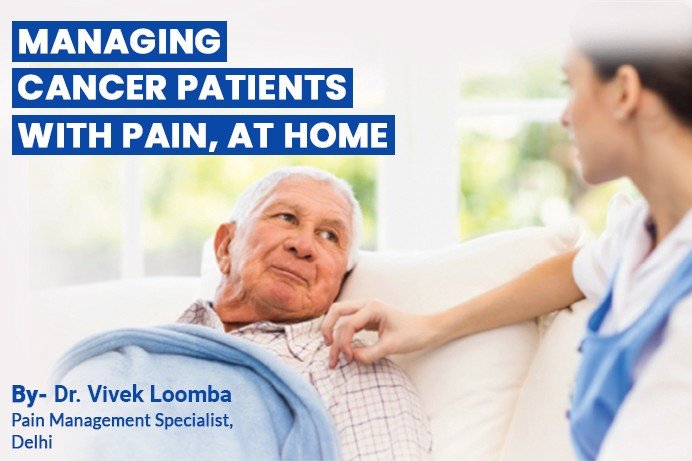Emergency No.
+91-9137-44-1392
Sun: Emergency Only
Mon - Fri : 9:00am to 6:00pm
MANAGING CANCER PAIN PATIENTS AT HOME
Cancer patients need a multidisciplinary team management. While most cancer treatment is given in a hospital setting, home care is an essential aspect of cancer management. These patients spend a significant time at home in between various treatments. Certain treatments can be done at home. This includes administration of tablets, liquid medications, application of patches on skin and topical treatments that are rubbed on the skin. In addition, sometimes even intravenous or injectable treatments can be given at home.
As such, training of the care providers along with a list of Do’s and Dont’s is needed for proper management of these patients.
Oral treatment at home — Do’s and Don’ts
The cancer medications need utmost care while handling them as they can be hazardous.
– Please follow the instructions of your cancer care team religiously.
– Take the right medicine at the right time.
– If you have to take many pills at different times of the day, use a pill sorter or a diary to help you remember.
– Not all medications can be crushed or cut. If a pill or capsule is too big, confirm with your cancer care team before cutting or crushing it.
– Medication side effects might be lessened by changing the schedule a little bit, but your cancer care team needs to help you decide if changing the schedule is best.
– Keep all medicines out of the reach of others, especially children, pets, and other adults who might take them by mistake.
Injectable treatment at home — Do’s and Don’ts
The cancer patients might need injectable treatment at home, including intramuscular, subcutaneous and intravenous injections. The intramuscular and intravenous are usually administered by trained professionals. However, the subcutaneous injections may be self administered just beneath the skin.
Whatever route of administration, sterile precautions must be strictly adhered to prevent any risk of infections in these immunocompromised patients. The right dose and right time of administration of medications is essential.
Discarding of medical waste
The medical waste including syringes, needles, IV sets, unused medications, gauze, gloves etc should not be discarded along with regular trash. These should be put in separate bags, and discarded as per the medical waste disposal policies.
Miscellaneous
Laundry
The clothes of these patients can be washed in regular laundry, along with those of other family members. However, they should be washed separately if soiled with sweat, vomit, urine or feces, or any treatment drugs.
Toilet use
The patients are free to share the toilet with other family members. However, it is considered safer to close the toilet lid and flush twice for 48 hours after the termination of intravenous (chemotherapy) treatment. Hand wash with soap and water is good hygiene practice.
Recent Posts
- Celebrating Life and Health on World Kidney Day: A Message from Dr. Vivek Loomba
- World Hospice and Palliative Care Day
- Restoring Hope and Comfort: Exploring Dr. Vivek Loomba’s Pioneering Role in Palliative Care and Pain Management for Cancer Patients
- How to manage pain during cancer treatment
- The role of physical therapy in pain management
Recent Comments
Recent Posts
-
 Celebrating Life and Health on World Kidney Day: A Message from Dr. Vivek Loomba
14-Mar-2024
Celebrating Life and Health on World Kidney Day: A Message from Dr. Vivek Loomba
14-Mar-2024
-
 World Hospice and Palliative Care Day
14-Oct-2023
World Hospice and Palliative Care Day
14-Oct-2023
-
 Restoring Hope and Comfort: Exploring Dr. Vivek Loomba’s Pioneering Role in Palliative Care and Pain Management for Cancer Patients
06-Jul-2023
Restoring Hope and Comfort: Exploring Dr. Vivek Loomba’s Pioneering Role in Palliative Care and Pain Management for Cancer Patients
06-Jul-2023
-
 How to manage pain during cancer treatment
19-Apr-2023
How to manage pain during cancer treatment
19-Apr-2023
-
 The role of physical therapy in pain management
19-Apr-2023
The role of physical therapy in pain management
19-Apr-2023






